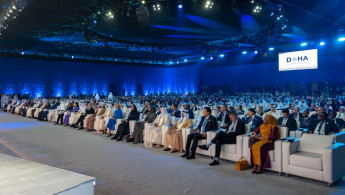Arab leaders reject international force for Gaza at Doha Forum
Arab leaders meeting in Qatar reiterated their rejection of forming an international force to occupy Gaza after Israel's war on the Palestinian enclave ends.
Regional heads had gathered in the Gulf state for the annual Doha Forum, where Palestine has been high on the agenda.
"No one from the region will accept... to put boots on the ground (following) an Israeli tank. This is unacceptable," said Qatar's Prime Minister Sheikh Mohammed bin Abdulrahman Al-Thani.
He also opposed any international force in Gaza under current conditions. "We shouldn't always talk about the Palestinians as if they need some guardian," he said.
The Palestinians were represented by the Palestinian Authority, which controls parts of the Israeli-occupied West Bank, but not the Gaza Strip, which is ruled by Hamas.
Despite their rivalry, Palestinian Authority Prime Minister Mohammed Shtayyeh said Hamas could not be eradicated.
They are "an integral part of the Palestinian political mosaic", he told the forum.
Yet, eradication is precisely what Israel is seeking with its war - in retaliation for Hamas's surprise attack of October 7 which killed around 1,200 people and saw some 240 hostages taken back to Gaza, according to Israeli figures.
The ensuing indiscriminate Israeli offensive against Gaza has killed more than 18,400 people, according to health authorities, including at least 8,000 children.
On Tuesday, Israeli Prime Minister Benjamin Netanyahu said following a conversation with US President Joe Biden that there was "disagreement" between the allies over "the day after Hamas".
The Israeli premier said he hoped "we will reach agreement here" but he vowed not to "repeat the mistake of Oslo", in reference to the 1993 peace accords signed in the US which pledged a two-state solution to end the Israel-Palestine conflict.
Jordan's Prime Minister Bisher Khasawneh warned that failure to deal with "the day after" the war would mean "uglier scenes in a year or two".
He hoped the war would act as a "wake-up call", especially as the conflict threatened a wider regional conflagration.
The Palestinian issue is "at the centre and the heart of all conflicts in the region", said Sheikh Mohammed.
"What's coming out of Gaza every day is not just affecting those forces in Lebanon or Yemen. It also affects an entire generation that might be radicalised because of these images," the Qatari premier added.
But concrete policies were lacking at the forum, which excluded high-level representatives from key regional players Saudi Arabia, Lebanon and Egypt.
The United States, Israel's key diplomatic and military ally, has previously indicated the Palestinian Authority could govern both Gaza and the West Bank in the aftermath of hostilities.
But the Palestinians say a much more fundamental response is needed, one that takes seriously "an independent, sovereign, viable state of Palestine on all the Palestinian territories" in Shtayyeh's words.
Qatar said it is still working on a fresh truce like the one last month that saw a one-week break in fighting and scores of Israeli hostages exchanged for Palestinian prisoners and humanitarian aid.
But Sheikh Mohammed warned Israel's ferocious bombardment of Gaza was "narrowing this window" for a ceasefire.
"There is a collective responsibility on all of us to stop the killing, to go back to the table to find a lasting solution," he said.
The war has encouraged groups linked to Iran, which backs Hamas, to launch attacks on US and allied forces in Iraq and Syria, while Yemen's Houthis have fired missiles and Israel is engaged in near-daily cross-border clashes with Hezbollah in Lebanon sparking fears of a regional conflict.





 Follow the Middle East's top stories in English at The New Arab on Google News
Follow the Middle East's top stories in English at The New Arab on Google News


